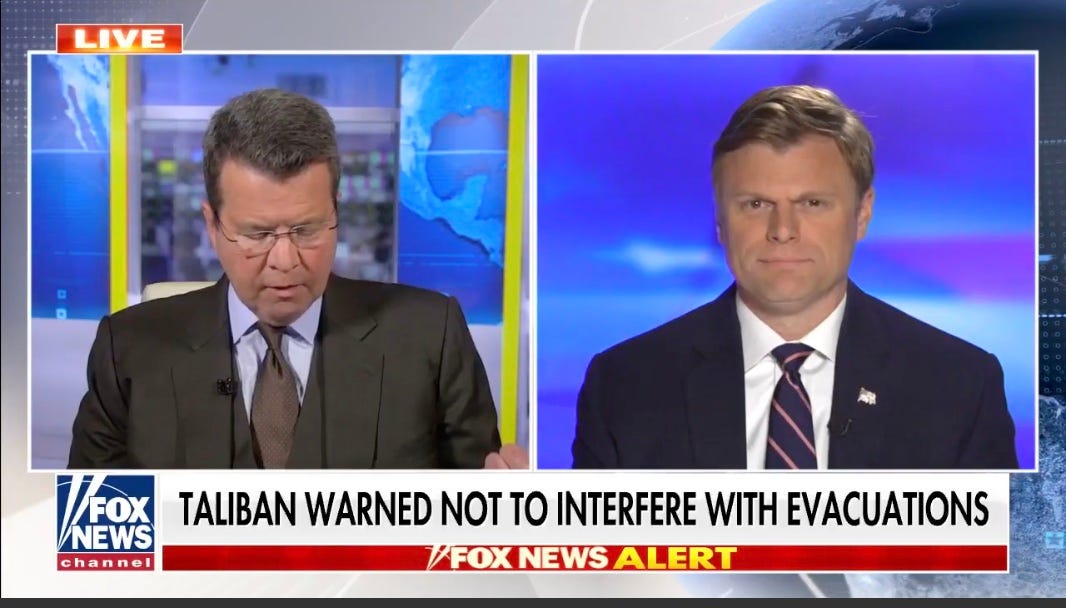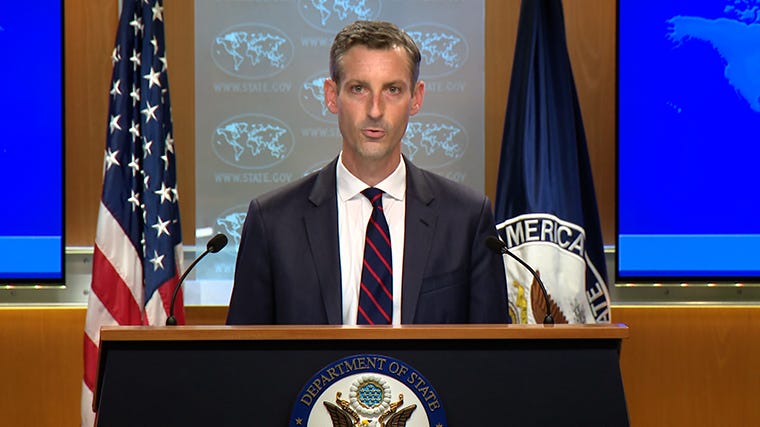A Post-Kabul Foreign Policy
Stop trying to export woke democracy and start restoring the USA as a realist, naval power
It wasn’t just the dream of transplanted liberal democracy that died as the Taliban entered Kabul in unconditional triumph. The entire edifice of what American foreign policy has become is now laid bare as a failure.
State Department spokesman Ned Price, very much the product of the Harvard Kennedy School of Government he attended, demanded of the Taliban, “an immediate cessation of all hostilities and the establishment, through inclusive negotiations, of a new government that is united, inclusive and representative – including with the full, equal and meaningful participation of women.”
Apparently the Kennedy School doesn’t teach that losing a war leaves one in a poor position to dictate anything.
The proclamation was par for course for Biden foreign policy. Just two months ago, what was the U.S. embassy in Kabul flew a rainbow flag, and proclaimed through a spokesman, “We remain committed to supporting civil rights of minorities, including LGBTI persons.” Loud and proud—and an act of self-indulgent, counter-productive cultural imperialism.
Even amid catastrophic and complete failure, those in power still believe that making high-minded demands to install liberal democracy is an effective policy. It never enters their minds that a country like ours today with a failed military, more indebted than France, and which allows a vocal minority of woke McCarthyites to replace its noble heritage with lies, might not be the best voice to preach governance and culture to others.
The entire liberal imperialist enterprise must go if we want to have friends beyond the increasingly pointless leaders in Old Europe who attend G7 and EU summits: think Boris Johnson, the underwhelming Tory (but I repeat myself) UK prime minister who recently suggested reconstructing Britain to be “more equal and… in a more gender neutral and perhaps a more feminine way.”
As Dimitri K. Simes writes in a timely piece in the upcoming Friday edition of The National Interest:
“The democracy promotion credo… goes far beyond the protection of the international status quo and advocates an openly revisionist policy, one that is designed not simply to contain other top non-democratic nations but to change their systems of government.”
The shrill voices demanding global liberal (and increasingly post-modern, woke, and leftwing) democracy are a stark departure from the Cold War, when the United States partnered with democracies, autocracies, and monarchies to thwart the genuine threat posed by the Soviet Union. Today’s drive for lefty democracy has done much to put us at extreme odds with Russia, and is even estranging us from Christian democratic governments in New Europe, Arab monarchies, and governments like those of Thailand and Burma.
One of the risks this creates is pushing Russia and China closer together despite major differences. Simes further observes:
“…democracy promotion is unnecessary (at least on geopolitical grounds) because there is little evidence that China and Russia, when left to their own devices, would be eager to form a global authoritarian alliance.”
In addition:
“The enhancement of alliances… must not become a paramount foreign policy objective that comes at the expense of larger U.S. strategic interests, such as the preclusion of a Chinese-Russian condominium. No help from Ukraine or Georgia can compensate for America being confronted with a new, most dangerous alliance dominating Eurasia.”
In other words, being greeted warmly in the foreign ministries of Old Europe and the annual Munich Security Conference will be of little value if we manage to induce an alliance between China and Russia—previously as unthinkable as the Taliban running our diplomats out of Kabul.

Does this mean America should abandon human rights? No—we should still advocate the rule of law, meritocracy, and accountable government. But that does not mean woke democracy, and we should act primarily by setting an example at home. The idea of setting an example rather than making high-minded demands has roots deep in America’s origins, and was espoused by John Winthrop in the Massachusetts Bay Colony: “For we must consider that we shall be as a city upon a hill. The eyes of all people are upon us.”
The United States should dispense with obsolete exercises like the State Department’s annual human rights report, and taxpayer-funded organizations like the National Endowment for Democracy and Radio Free Europe. These enterprises made a lot of sense during the Cold War and some sense during the 2000s, but today use tax dollars to drive a cottage industry of activists who want America to satisfy their own grievances and agendas. Unlike political warfare against the Chinese and Iranian governments, which is justified given their belligerence, these “pro-democracy” tools make pragmatic alliances harder and have a 30-year record of failure.
We should take other steps to focus more singularly on threats from China and Iran. NATO in its current form is obsolete. We should insist that the alliance secure Europe and the North Atlantic as a condition of continued U.S. membership, freeing our military to focus on deterring China in the Pacific and Iran in the Arabian Gulf.
Many people and institutions deserve blame for misleading successive presidents and the public about the supposedly sufficient state of the Afghan Army and police, but the current and recent leadership of U.S. Army, Central Command, and Special Operations Command deserve the greatest blame. The USA should replace the rough formula by which defense funds are split three ways between the Army, the Air Force, and the Navy-Marine Corps. If everything is a priority, then nothing is a priority. We should cut the Army to a base force and restore America’s historical focus of being a naval and aerospace power. We should remove all ground forces from Europe and South Korea and establish a new joint command with Japan and Taiwan to deter China.
Finally, we should devote urgent effort to dividing Russia from China. One option to begin improving relations could be a joint negotiation with Japan after which Tokyo and Washington recognize Moscow’s sovereignty over Crimea in exchange for Russia returning Japanese islands it seized at the end of World War II, and also formally agreeing to the Russia-Alaska maritime border. That could lead to a conditional removal of sanctions on Russia related to lapses of human rights and corruption, which are depressing but of no real relevance to the USA.
Few among our national security elite realize yet how much the world has changed this past week. Progressives in the White House and elsewhere in the foreign policy food chain have harmed us immeasurably. We need bold action to refocus on what matters.





Prior to the Cold War, everyone in America agreed that maintaining a large standing army in peacetime was both dangerous and excessively expensive. We should get back to that ethos. The 9-11 attacks gave our military-industrial complex the excuse it needed to keep the bloat going for another 20 unnecessary years.
Also, don't forget to cut the useless and dangerous CIA while we are getting rid of stuff.
It's not "woke democracy", it's "woke fascism". In Afghanistan that meant female legislators who had never even been to the provinces they supposedly represented in a rubber stamp legislature giving 'legitimacy' to a thoroughly corrupt kleptocracy sucking up all the American money while soldiers went hungry. But, it all looked very 'enlightened' on paper.